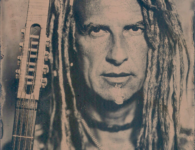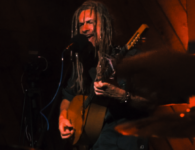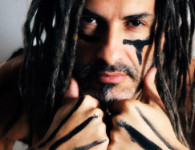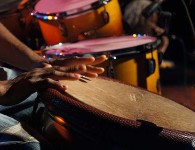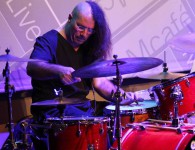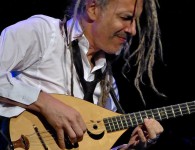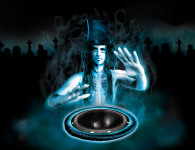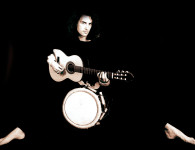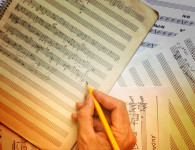Carnal Carnival on The Music And Myth
Grand Baton’s Carnal Carnival – the timeless allegorical spirit of the carnival and the streamlined vibrations of modern electronic music
by Andrei Cherascu, March 2015 (Romania)
This week The Music and Myth is venturing into new musical territory with a feature on Grand Baton’s 2013 release Carnal Carnival. A month ago I’ve had the opportunity to witness the profoundly gifted Sofia Rei in concert at the Wiener Konzerthaus. I’ve made no secret of my fondness for this musician. Her performances always possess an unearthly intensity and candor and that is owed as much to Sofia’s charisma and impassioned delivery as it is to the band’s commitment and virtuosity. One of her band members that evening was frequent collaborator, composer and multi-instrumentalist JC Maillard. I’d been familiar with JC only from his collaboration with Sofia. Since his talent and timing had been an integral part of the polish of their performance in Vienna, I decided to check out some of his other musical endeavors. I bought Carnal Carnival after the show and asked JC to sign it for me. When I told him I’m looking forward to playing the record he warned me that it’s “loud. It’s not like what I play with Sofia.” That would end up being the mother of all understatements.
Essentially a hybrid composition of rock and dubstep elements with the temperament of Caribbean carnival music and the “vocabulary of the Ka drum” – as the musician himself expressed it – Carnal Carnival is a testament to Maillard’s versatility as a songwriter and his dauntlessness in experimenting with and expanding on music with a long-established heritage.
The record is the third in Maillard’s longtime study of the “Ka” – the traditional drum from his birthplace of Guadalupe – as a melodic instrument. The ambitious tribute started with the praiseworthy Ka Suite, Maillard’s first solo record, before taking the shape of Grand Baton, a project that involves Thierry Arpino (drums) and Arnaud Dolmen & Olivier Juste (Ka drums) among others. Le Grand Baton was released in 2007 and distanced itself from the acoustic origins of Ka Suite with a sound that was firmly planted in the fertile soil of rock. In the same way, Carnal Carnival is starting to break away from rock and to experiment with pronounced elements of dubstep.
The album begins in a bit of an odd manner, with the ninety second-long “Welcome to the Carnival” which is more of a teaser for the closing track “Idemdito” than an actual intro for the album. It doesn’t hurt the record, but it also doesn’t add anything to its overall narrative at this point. With “Caribbean Raider” however, Carnal Carnival is already at full throttle. The most instantly captivating of the songs, this track is a great indication of what the listener can expect from the music: electrifying distorted guitars, hypnotic chant-like vocals and of course powerful percussion that creates an almost sentient rhythm. As a vocalist, Maillard is more shaman than singer. He makes wise use of his voice to create everything from mesmerizing incantations to eclectic falsetto yelps and barks. Though at particular times the lyrics do leave a bit to be desired, it doesn’t end up hurting the compositions since their role is to help induce a trance-like state rather than for straight up storytelling.
A track evidently designed for the dance floor, “Hands Up” delivers in spades. With a dynamic and unpredictable construction, vocals that switch from hypnotic and velvety to forceful and unrestrained and a concentrated dose of dubstep, the song exhibits the perfect balance between the timeless allegorical spirit of the carnival and the streamlined vibrations of modern electronic music. “L.O.V.E.L.F.O” attempts something similar but doesn’t manage to achieve the same results. However, the song is noteworthy for some killin’ Ka drums courtesy of Arnaud Dolmen and Olivier Juste. Speaking of awesome percussion, Carnal Carnival continues with “Tired of Myself” – in my opinion the highlight of the record. Everything just clicks on this song, from the fantastic percussion and extremely kinetic groove to the clever lyrics and outlandish singing.
“Drop Off Your Bags” is a dance floor diamond in the vein of “Hands Up” executed to psychedelic perfection while “Pa Di Mwen”, another one of the standouts, is a throwback to the rock resonance of Le Grand Baton, complete with lyrics in Haitian Creole and a deliciously distorted guitar solo towards the end, reminiscent of Marc Ribot in Ceramic Dog. At this point I have to also commend Thierry Arpino, whose drums are consistently captivating throughout the entire album. Clearly, all band members are exceedingly talented musicians, which adds a level of complexity most often lacking in electronic music. Another factor in the depth of the compositions is likely Maillard’s fascination with finding melody in percussion.
The record ends with “Idemdito”, an almost eight-minute long roller-coaster ride of sound effects, powerful drums, surprisingly melodic bridges and constant changes of pace – a very inspired closing track that seems to contain the defining elements of the rest of the songs all rolled into one. The fact that the last ninety seconds are basically “Welcome to the Carnival” creates a nice ouroboric narrative which is very fitting since Carnal Carnival – in spite of its “club music” form – is a meditative, culturally conscious work.
As a modern, urban work of music Grand Baton’s Carnal Carnival succeeds on every level. It’s a bold new approach to a deep-rooted musical heritage, a thoughtful tribute to the musicality of an instrument and ultimately just an all out entertaining album.
I could close the feature with big words and fancy metaphors but instead, I’m going to just quote what I said to JC on Facebook after having heard the album for the first time:
“Damn, I’m really enjoying Carnal Carnival! Awesome sound and attitude; it’s what I call a record with balls!”
Highly recommended by The Music and Myth!
Le Grand Baton on Metal Express Radio
by Lior “Steinmetal” Stein, April 2008 (Israel)
Grand Baton is a joint unit of Caribbean, French and American who dares to reach out, in its music, to some obscure corners and to mix a collection of styles. The band, lead by their vocalist /guitarist, which is also the founder and the song writer, Jean Christophe Maillard is a project that is meant to present the mixture of Rock , Fusion and progressive elements combined with traditional Guadeloupe music. Maillard can be considered as a pioneer regarding this combination of various genres and his debut album, Le Grand Baton, can be considered as a fair presentation.
The music on the album is pretty complex and drawing its complexity from multiple genres of music and gives this project a fine tune, which on most cases, doesn’t fail.
The production of this release is very good and well engineered. Every role in the music is in place and the roles of the players are done with a high measure of skill. For the non-French speaking this album can provide, in most songs, a sort of atmosphere and sensation of the Caribbean. The trouble starts when the songs are too complex and that can feel like a sort of headache to some listeners. It should be noticed that a lot of thought was invested in this release but sometimes it gives off the notion that the composer was focused too much on complicating the songs rather than letting them flow as they go.
Maillard’s music brings out the best from his world and the Rock world. As a vocalist he addresses the listeners with various voices that range from small attack dosages to soft clean and silky tunes. As a guitarist he demonstrates some nice riffs of Rock and Progressive Rock infused with Reggae and Funk. This mixture completes the full picture of this album. The other members of the band work accordingly to Maillard’s lead and do a fine job doing so.
As for the tracks, Le Grand Baton gives almost everything to the fans in regards to new experiences but it lacks something important which is interest. The first thing about the album that can drive some listeners mad is the first track, “Don’t Copy”. The first thought that comes to mind from this particular track is that the listeners copy albums and have to be warned not to do so rather than asked not to copy. This track is not a suitable opener for any album no matter the genre. Second, most of the tracks have a hard time providing any interest and are swallowed in their own complexity.
Although there are many weak spots, there are some standouts like “File”, which is a nice tune with a good chorus and comes across as Heavy Rock. “Zafe A Kuule La” is another good track with a lot of progressive elements. The last standout is “Les Jours S’allongest” which can pretty much paint a full picture of the album. It has a captivating rhythm, especially on its ending verse.
Grand Baton is a fine project, which with some minor adjustments can go far. Millard’s purpose in his composing is brilliant and he has a lot to give to the music industry. It’s hard not to think that this release is his final word.
Le Grand Baton on RockSerbia.net
by Branimir Lokner, February 2009 (Serbia)
Progressive/avangarde/fusion/folk/crossover
Le Grand Baton is a brainchild of gutarist/composer/singer Jean-Christophe Maillard, also known as Mbutu, a native Carribbean and resident in France. A s/t album is a his latest issue, and as I saw from web informations, he did a lotta’ effort in promotional activities, so his product has received a many mostly positive reviews/reactions. His band are consists of members from France, The Carribbeans and USA, and all of them has given a maximum efforts that all things in final get funkcionize as well.
As a well-experienced musician and author Jean-Christophe in some way has tested his creativities, communicated with many stylish and performing options. There’s no doubt that he deserve only respect for his authors work and evident original views, so his “s/t album are full of unexpecting and in the same time challenging places. A present songs/themes were performed in different manner, and we can find here and there something taken from Frank Zappa legacies, King Crimson free avangarde/progressive kitchen, Primus plying “brutality”, and all of that fullfield with folk/roots idioms. Overdriven and fuzzy guitar passages are mixing with national “slave drum” KA, so as a result we can hear many so call “strange” but at the same time inspirative sounds/reflections. A songs are mostly written in CREOLE language, where dinamic
motorization has followed practically complete materials. Le Grand Baton’s “s/t issue could be a one of most original product released during the previous year if we speak about progressive/avangarde and generally crossover options.
Le Grand Baton on Ectagon
by Svend Olaf Olsen (Norway)
Le Grand Baton is the latest project of french, native Caribbean, guitarist composer and singer Jean-Christophe Maillard (aka Mbutu). He is merging traditional drum music from Guadeloupe with rock music; creating ethno-rooted-pop rock with steady rythms and strong melodic lines. Relying heavily on electric overdriven guitars combined with the mighty goat skin “slave drum” known as “Ka”, this album has a strong world-music-vibe. Mbutu’s music is strong and energetic, with catcy melody lines. He sings really good and his guitarwork is very nice. The music is overall pleasing, and the modern production and nice sound quality makes this album grow from the first time you put it on. Recommended.
Le Grand Baton on Progarchives
by Windhawk
A wild collection of tunes by this multinational ensemble.
The Caribbean gave birth to what seems to be the foundation for these 14 creations (the fifteenth a plead to not copy this release) – a a particular type of drum called Ka – referred to as a slave drum; with references to the dark period of mankind when slavery was common as the origin of that reference.
Quirky, wild and often tribal and ethnic sounding beats from regular drums and this instrument is the backbone on everything here, and the first half a dozen tracks or so are the wildest, with distorted guitars and bass combined with rhythms and eerie vocals to produce what sounds like a post-apocalyptic zombie feast.
The music gets more mellow and jazz-tinged as the album evolves, ending up in musical territories pretty close to what Norwegian sax player Bendik Hofseth produced on his debut 20 years ago. It’s a fascinating ride in different musical territories, and as long as the Creole vocals aren’t regarded as troublesome a ride many should enjoy.
Le Grand Baton on Proggnosis
by Marc, February 2009 (Canada)
A very interesting cd this Le Grand Baton, a project of French musician Mbutu (Jean-Christophe Maillard, who originates from Guadeloupe.
The music features some traditional drums from les Caraïbes, so it offers a “World music” mood to the listener, even though it is often driven by aggresive electric guitars played in a manner that could remind of Steven Wilson’s or Brett Kull’s style. Some of Peter Gabriel more intense music could also be an acceptable reference. Because of that, I think that that fans of the heavier side of Prog should be interested by Le Grand Baton.
Mbutu sings in creole and he has a voice that really reminds me of Québécois singer Luck Merville (born in Haiti), that also put out an album in creole in 2004 ( Ti peyi a). In my opinion, this is quite a compliment I make, Merville having reached a star status in Canada and in francophone Europe.
Le Grand Baton is an excellent album to seek out for listeners of “World music” with a rock edge. Take a listen via the band’s myspace page. Highly recommended.
Le Grand Baton on Progressive Rock & Progressive Metal
by Carlos Vaz, June 2008 (Brazil)
Le Grand Baton is the latest project of french, native Caribbean, guitarist composer and singer Jean-Christophe Maillard (aka Mbutu), well known for his work in Gwoka music (traditionnal drum music from Guadeloupe); it is a powerful fusion of this heritage with rock music. To describe his music, Jean-Christophe would refer to the “primitive-sophisticated” style of Jean-Michel Basquiat’s painting. Le Grand Baton plays many different musical styles combining elements from Progressive Rock, Alternative Rock, Heavy Metal, Melodic Metal, Psychedelic Rock, Kraut Rock and Experimental Rock, putting together influences from bands such as “King Crimson”, “Frank Zappa”, “Mahavishnu Orchestra”, “Henry Cow”, “Can” and others. In fact, their music is a collection of musical contrasts, characterized by ambitious lyrical themes, with a variety of musical techniques, that sounds sometimes harmonic and sometimes rhythmic experimentation, where rapid rhythm drumming contrasts with layered atmospheric guitar textures, including different vocal tones, giving the music a unique and special vibration. Le Grand Baton have created a collection of songs, that deserve special credits for trying something different, a deep instrumental excursion to all fans of all different progressive music styles. “Le Grand Baton” album was recorded and mixed from April 2004 to August 2006 in Guadeloupe (Caribbean), Claret (Frence) and Paris (France) at “The Living Roon”, by Gilles Olivesi and Mbutu. Mastered by Eric Chevet at Masterdisk Europe. Producing and artwork by Mbutu. A special and particular attention to and my favourite songs are: “Ou La Ka Palé-intro”, “Atoupannan (Ou La Ka Palé)”, “Filé”, “Zafè A Koulè La”, “Gran Rivyè”, “An Mitan Pit”, “Toutlè Dépi Dé Jou”, and the best song is “Les Jours S’allongent”. The musicians on this project are: Pascal Rey – Drums, Philippe Makaïa – Ka Drum and some spoken voices, (Jean-Christophe Maillard) Mbutu – Lead Vocals, Ka Drums and all Guitars, as a guest musicians Etienne Mbappé and Cyrile Nobilet – Bass Guitar. Highly recommendable…
Le Grand Baton on Progressive Ears
by Ffroyd, June 2008 (USA)
I like new music. By the term new music, I’m not just referring to something that has just been released. I mean something in a style that I haven’t heard before…something groundbreaking…something truly…progressive. Le Grand Baton is a band that fits that description very well. Their management recently contacted me and after hearing one track I was immediately attracted to this strange and wonderful music. It is rare that I’m drawn to new music this quickly but Le Grand Baton has me hooked.
The project centers on guitarist, vocalist and composer Jean-Christophe Maillard, a native Caribbean who incorporates his island heritage into a very unique style of rock music. Maillard also goes by the nickname Mbutu, which comes from the Creole word “boutou” meaning drumstick. Also involved in Le Grand Baton is world-renowned drummer Pascal Rey and percussionist Phillip Makaïa. While Mbutu plays all of the guitars, he has a few guests playing bass in Etienne Mbappe & Cyrlie Nobilet.
As you might have already surmised, percussion plays a huge role in the sound of Le Grand Baton. In fact, the central instrument used to create this music is the Ka drum. Long regarded as taboo because of its implications to slavery, the instrument has recently been brought back into the culture as a weapon of the artists. A revolutionary new music called “Rude Ka” or “Gwoka” has developed in the Caribbean region as a result. The music incorporates the heaviness of hard rock and heavy metal music with the haunting rhythms of the Ka drum and other island percussions. It is a truly unique and captivating style of music.
The first few seconds of the album made be think of the title track from Steve Walsh’s Glossolalia album. The intro to “Ou Laka Palé” has a heavy guitar and tribal rhythm that is very similar and had me worried for a little. Fortunately this is the only part of the album where I hear an almost identical riff and it’s most likely coincidental. The music goes through an amazing amount of different moods throughout the disc. There are excellent world music elements that dwell on the poppier end of the spectrum but always in a sophisticated and enjoyable way. On the other side of the coin, the band can totally rock and at times very, very heavy. There are moments on here that remind me of Sleepytime Gorilla Museum a bit. The lyrics are sung in the Creole language and remind me of some of the better French and French Canadian prog out there. The vocals especially sounded like Pollen’s Jacques Tom Rivest to me. They also have a more experimental/avant-garde edge and space rock elements that make the music all the more diverse. Also, if you enjoy the stuff King Crimson was doing in the 1980s, you should find a good bit to enjoy here as well.
I tell ya, I am completely in awe of this CD. Le Grand Baton is an impressive new force in the world music scene and they have received warm accolades from many well-respected members of the musical community already. I urge you to check out the tracks on the band’s myspace page and I have a strong feeling that you’ll be just as thrilled as I was upon listening to this music for the first time. I would highly recommend this. I wish more new music was as original as this.
Le Grand Baton on Progressor
by Olav Martin Bjørnsen, December 2008 (Uzbekistan, Norway)
Prolusion. LE GRAND BATON is a band project lead by Jean-Christophe Maillard, also known as Mbutu, a native Caribbean living in France. The rest of the band apparently has an international flavor, as the group’s homepage lists Paris and New York City as other geographical locations for the outfit. Mbutu apparently has made a name for himself in a musical style known as Gwoka, and this current project mixes this ethnic musical genre with rock.
Analysis. The main and dominant instrument on this creation is a drum known as Ka. With references to the ancient tragic history of the slave trade it’s also known as a “slave drum”. This goat-skin covered rhythm instrument has a peculiar sound, but it’s the way it is utilized and played on these compositions that really makes an impact. Mixed with regular drums, the groovy patterns served by the combination of these rhythm instruments have a distinct ethnic feel to them, world music or folk music, but with an edge. Voodoo is a key word here, I guess; the band describes themselves as “the true voodoo children” and there’s a distinct tribal feel of the dark kind seeping through most of these songs, where the rhythmic work sets up a foundation often wild as well as frenzied, the kind of rhythms you’d expect to hear when stumbling upon forbidden rites performed in the deep jungles, in celebration of nameless horrors and decadent excesses. The first half dozen compositions add twisted, dark rock music to these almost decadent, quirky rhythmic displays. Booming distorted bass lines or eerie melodic twists, with even more distorted guitar licks and riffs placed upon those, form dark and ominous compositions, the kind of music fitting for a post-apocalyptic zombie feast. Effective use of weird vocals and whispers in those creations enhance this atmosphere even more. On the rest of this CD there’s a drastic change in the music explored: the melodies, moods and atmospheres calm down and mellow down, moving more and more towards jazz in style. The ethnic beats are still present and the rhythms may still be on the wild side at times, the compositions remain rather complex in nature, though the dark and ominous feel disappears. Slight remnants remain for a while, but as this production draws to a close with the long track Les Jours s’Allongent, we’re in a different world altogether, as this creation is pretty close in style and sound to what an artist like Bendik Hofseth produced in the late ‘80s: mellow, melodic jazz with strong leanings towards pop and rock. This makes for a rather adventurous production in many aspects; the Caribbean ethnic rhythms and voodoo heritage mixed first with rock close to avant-garde and even punk in style at the start, the sudden change towards mellower rock and further evolvement towards jazz in stylistic expression is a daring one. Not always successful though, but none of the songs here comes across as fillers or as undeveloped either.
Conclusion. For liberal-minded followers of rock music that feel a variety of styles, moods and genres is a treat, this production should be worthwhile investigating. The compositions, especially the dark and somewhat brutal ones opening this album, may not be appealing at first; but many will find that over time they get more and more fascinating as one adjusts to this rather unique stylistic expression. The mix of ethnic music and rock may also attract the attentions of jazz- and folk-rock aficionados. The most conservative among them may find this release a tad difficult to relate to, but it should be of interest to quite a few among that crowd too.
Le Grand Baton on Sea Of Tranquility
by Michael Popke, July 2008 (USA)
Here at the Sea, we’re all about introducing eclectic new sounds to you, the adventurous listener. Among our latest discoveries is Le Grand Baton – a percussion-heavy collective with members hailing from France, the Caribbean and the United States with a sound revolving around the Ka drum. That particular instrument, popular in Saint Lucian folk music, is played on the ground rather than upright, giving it an altogether distinct sound. Many members of this self-proclaimed “voodoo rock band” play it on Le Grand Baton, infusing 15 Creole-sung songs with a rhythmic sensibility that will rattle your ears and shake your brain. The drums, combined with electric guitar and the strong, often-falsetto voice of Jean-Christophe Maillard, listed in the credits as Mbutu (Creole for “drumstick”), deliver a universal message — one in which polyrhythmic pulses and righteous riffs trump language barriers. Think King Crimson gone tribal, or a more kinetic Peter Gabriel, or maybe a less frenetic System of a Down. The brief spoken-word passages can be annoying, and at times you might feel completely lost if you’re unable to get to the same headspace as these guys. But lost in a good way, as you let the ethno-prog sounds of Le Grand Baton transport you to another place and time.




